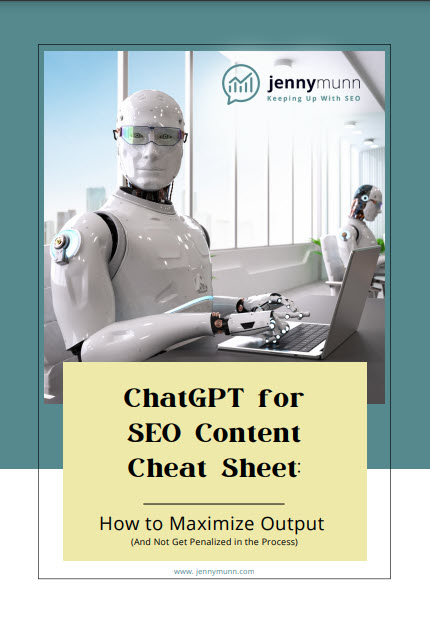 Upon reading a hilarious viral article by a new mom frustrated with the contradictory advice of infant sleeping experts, I was inspired to do the same with SEO.
Upon reading a hilarious viral article by a new mom frustrated with the contradictory advice of infant sleeping experts, I was inspired to do the same with SEO. Listen, I’m an SEO professional, but even I shake my head sometimes at the content experts are putting out there these days. What’s more, sure, everyone might understand from a super high-level strategical level what to do, but from a tactical level everyone is baffled.
Because I just got into the SEO field a few years ago, I entered into it when things were already evolving to be less technical, less checklist, and more holistic marketing (what the *%#@ is PageRank sculpting?!?). Good for me because my background is in marketing and SEO copywriting, but bad for others who only know how to do the conceptual and tactical activities that no longer work and they’re baffled. Doubly bad for business owners and marketers in other disciplines who are now more confused than ever.
Without further ado, I present the Top 10 Most Contradictory Pieces of SEO Advice in 2014. I’m not providing educational information about what is right or wrong in this post – just a list of contradictions that make you want to bang your head against the wall. Take this tongue-in-cheek advice with a grain of salt and let’s have some fun:
1. The New SEO is here. The more things change the more they stay the same. SEO has not changed and has always been the same. But different.
2. You should no longer target 1-2 keywords per page. Add in variations and synonyms. Still target 1-2 keywords per page.
3. Guest blogging is dead. Guest blogging should only be done if it’s not for SEO in mind. Guest blogging with with a link back is okay if it’s done right.
4. Linkbuilding is dead. Create content people want to link to. It’s still important to get high-quality links out there on your site. Promotion and outreach is important.
5. Authorship is the best thing since sliced bread. Authors should implement authorship to help users discover their content more easily in search. Google has cut authorship in search results by 20-40%.
6. Don’t focus on keywords. Use your keywords in strategic places on the page.
7. Social signals are critical to SEO. Social media has replaced linkbuilding. Google cannot read signals from Facebook and Twitter as part of the ranking algorithm.
8. On-page SEO is not enough to get a site to rank. On-page SEO only can be sufficient for sites not in a very competitive niche.
9. Track, measure, and monitor SEO results. Track the right data. Don’t track data that no longer matters. Keywords that send traffic are another important piece of your analytics pie. Google no longer shows keywords and encrypts this data. Ranking reports are obsolete. Check your rankings, focus on improving rankings, and your conversion will improve.
10. Don’t focus on keywords, focus on topics. And concepts rather than specific keywords. Still do keyword research. Keywords are the language of our customers. Use keywords that all mean the same thing so you can be relevant for all of them.
*BONUS*: 11. SEO is dead. Don’t focus on making Google happy. Making your content findable online is important. SEO is the discipline of making content findable.
Hope you enjoyed those! I had way too much fun writing them. What’s your favorite piece of contradictory SEO advice? Drop a comment below and let’s have some fun!
The following two tabs change content below.


SEO |
Jenny Munn
Jenny is an independent Digital Marketer and SEO Consultant with more than 10 years of experience helping companies and content creators generate brand awareness, traffic, and conversions with SEO. She is a frequent speaker and is on the faculty for the AMA (American Marketing Association) and has taught SEO to thousands of marketers over the past 10 years.
Latest posts by Jenny Munn (see all)
- Four 2024 SEO Planning Tips for World Domination - November 16, 2023
- SEO Planning Tip: Why You Need a CYA Clause - November 3, 2023
- How Long Does SEO Take to Show Results? (Updated for 2023) - August 9, 2023



12 Comments
Okay, here’s one: Don’t set up Analytics because Google will see a high bounce rate and punish you in the rankings. Google says it doesn’t use Analytics data like bounce rate to affect your rankings. A high bounce rate can negatively impact your Quality Score. A high bounce rate could simply mean that visitors found what they were looking for on that page.
Tom – love, love, love this! And spot on. 🙂 Super contradictory.
Thanks for this, Jenny! Good to know that I’m not the only one that thought there were mixed messages out there! I can only imagine how confused my small biz customers must be, especially since after their new sites are launched they seem to be getting bombarded with messages from overseas SEO companies telling them all the things they are doing wrong on their site, and offering all kinds of unscrupulous services. Glad to have you on hand to weed through all the contradictions and tell it to us straight.
Thanks, Beth! SEO is pretty confusing these days because it’s just not black or white and there is no short answer. And, different answers apply to different sites and situations.
That being said, the foundational, basic elements of good SEO still have not changed in years. It almost takes learning SEO from the ground up again to reinforce or dispel notions people have.
Here’s one where I continue to hear contradictions – publish ‘epic’ content vs. just get it out there and quit worrying so much about the ‘epic’ part.
Good one, Ben! The though of having to produce “epic” content on a regular basis is enough to sit in paralysis by analysis mode for weeks. Whew.
Thank you Jenny!
Great stuff Jenny! For my part, I’m especially puzzled by your 3rd example, exemplified in the recent and infamous discussion about guest blogging by Matt Cutts. He stipulates that there are still a lot of great guest bloggers out there, but then advises businesses to only use the technique very sparingly, like it’s the trans fat of digital marketing.
If the technique is truly damaging to a website, regardless of the quality of the guest posts, why not remain firm in his announcement that guest blogging is dead? But if there are great guest bloggers out there after all, why not return the technique to legitimacy, allow for the sharing of PageRank, and allow good writers to do good work?
My apologies John for misspelling your name in my reply.
Jon – I wouldn’t paint Matt’s comments with a broad brush here as there are tons of legitimate sites, i.e., Copyblogger, who have really great guest bloggers on its site from time to time. There’s nothing in me that would deduce that Google would hammer a site like this or other quality one like it for engaging in this practice. As you know there is the antithesis of this where it is abused significantly. I think where sites get into trouble in allow guest writers is when it is easily recognizable that someone is performing the duty all in the name of gaining some SEO value from it, i.e., exact match anchor text and all the other things that Google intends to put the clamps on. In case you or others reading this thread haven’t seen this article I think it’s worth a read – http://www.copyblogger.com/guest-blogging-not-done/.
Hi Ben,
Thanks for the link to the copyblogger article, I’ll definitely check it out!
John – Jenny also weighed in here on the ‘guest blogging’ deal – https://www.youtube.com/watch?v=yll-nnIjZAg&feature=autoshare